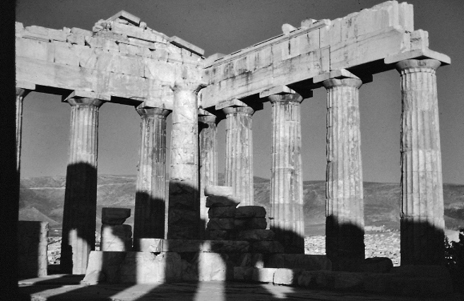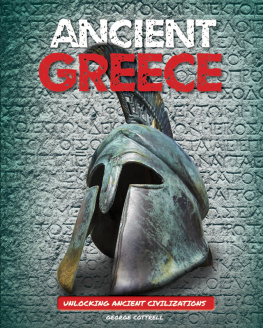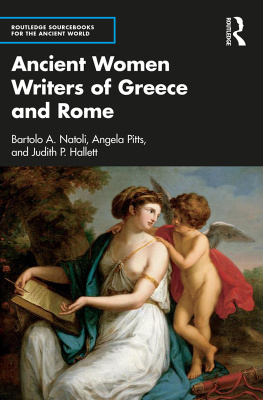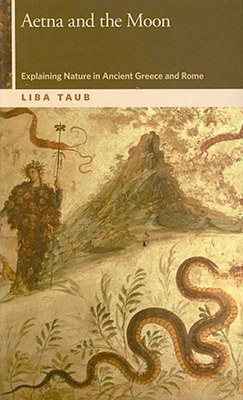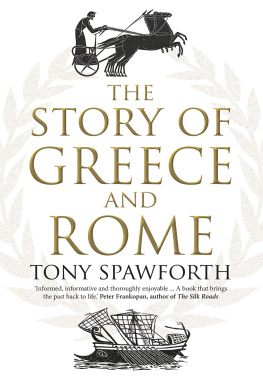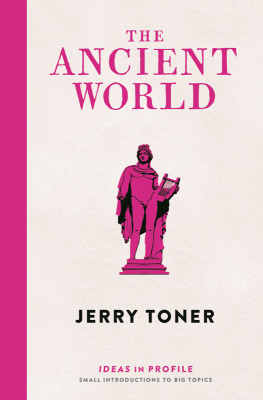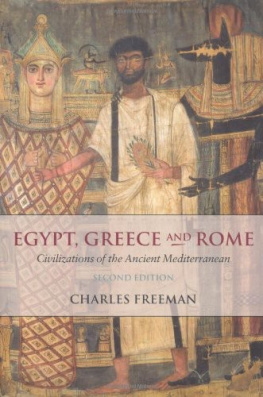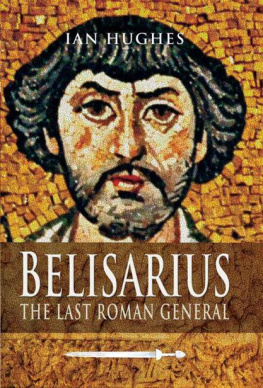Environmental Problems of the Greeks and Romans
Ancient Society and History
J. DONALD HUGHES
Environmental Problems of
the Greeks and Romans
Ecology in the Ancient Mediterranean
Second Edition

1994, 2014 Johns Hopkins University Press
All rights reserved. Published 2014
Printed in the United States of America on acid-free paper
9 8 7 6 5 4 3 2 1
The first edition was published as Pans Travail: Environmental Problems of the Ancient Greeks and Romans .
Johns Hopkins University Press
2715 North Charles Street
Baltimore, Maryland 21218-4363
www.press.jhu.edu
Library of Congress Cataloging-in-Publication Data
Hughes, Donald J., 1932
Environmental problems of the Greeks and Romans : ecology in the ancient Mediterranean / Donald J. Hughes. Second edition.
pages cm. (Ancient society and history)
Includes bibliographical references and index.
ISBN-13: 978-1-4214-1210-8 (hardcover : alk. paper)
ISBN-13: 978-1-4214-1211-5 (pbk. : alk. paper)
ISBN-13: 978-1-4214-1212-2 (electronic)
ISBN-10: 1-4214-1210-1 (hardcover : alk. paper)
ISBN-10: 1-4214-1211-X (pbk. : alk. paper)
ISBN-10: 1-4214-1212-8 (electronic)
Human ecologyGreeceHistory. Human ecologyRomeHistory. GreeceCivilization. RomeCivilization. GreeceEnvironmental conditions. RomeEnvironmental conditions. I. Title.
GF581.H85 2014
304.280938dc23
2013018546
A catalog record for this book is available from the British Library.
Photographs courtesy of J. Donald Hughes and Pamela L. Hughes except where noted otherwise. The final dates in parentheses represent, as closely as possible, the year the photograph was taken.
Special discounts are available for bulk purchases of this book. For more information, please contact Special Sales at 410-516-6936 or .
Johns Hopkins University Press uses environmentally friendly book materials, including recycled text paper that is composed of at least 30 percent post-consumer waste, whenever possible.
Contents
Preface
During my earliest visits to Athens in 1959 and 1966, it was still possible to enter the Parthenon and to look out on the then-barren hills of Attica between the columns. As I stood there one time, I remarked to my wife Pamela, I wonder if the ancient Greeks had any idea of what they were doing to the environment. The question continued to bother me, and I decided to try to find out the answer. I asked senior colleagues about it, and they warned me that I would not find any information along those lines. Still, as an experienced seasonal ranger in Yosemite and Grand Canyon, the idea struck me that there might have been something like national parks or wildlife refuges in the ancient world. They had numerous sacred grovescould these have served to protect trees and animals?
I was a student at the American School of Classical Studies at Athens, so two great libraries, including the Gennadeion across the street, were available to me, and I began to work my way through anything that seemed relevant to my questions, which soon broadened to include the environmental attitudes and actions of the Greeks, Romans, and Egyptians, and indeed the whole Mediterranean world. I began to see that modern environmental problems had precedents in antiquity, to one degree or another. Forests had been overused to the point where some of them disappeared. Animal species had been hunted and seen their habitats degraded to the point where they became extinct in certain areas. Poets complained about air and water pollution. Archaeology revealed piles of waste from mining and metallurgy. These are only a few examples that I brought together in my book Ecology in Ancient Civilizations (University of New Mexico Press, 1975). It was, I believe, the first book published specifically on the environmental history of the ancient world. George Perkins Marsh, in his pioneering work Man and Nature (1864), included a section on the environmental damage caused by the ancient Romans and its possible effect on the decline and fall of the Roman Empire. After that, a few succinct speculations appeared in the literature, but no extensive treatment of the subject was published until my book in 1975.
I continued my research and took a number of trips to Greece, Italy, Turkey, Egypt, Jordan, Israel, Spain, Portugal, and Mediterranean France. Libraries and museums in the United States, Europe, and Russia were of great help to me. I received a request from the Johns Hopkins University Press to prepare a new, reorganized study, which appeared in 1994 as Pans Travail: Environmental Problems of the Ancient Greeks and Romans . The present volume is a second edition of that book, with new sections, chapters, illustrations, and the benefit of eighteen additional years of research, experience, and reflection. My areas of research are predominantly history, ancient literature, archaeology, scientific reports, and continued study of the landscape, including visits to significant sites. In recent years there has been a rapid increase of interest in ancient environmental history, with attendant publications that receive attention in this edition.
It may seem that awareness of environmental issues arose only in modern times, as the result of concern about problems such as pollution and the scarcity of natural resources. But environmental history has revealed that there were antecedents to these present-day conditions. The civilization of the ancient Mediterranean, and of Greece and Rome in particular, is of unique importance to later peoples who were inspired by it, such as the Europeans, the Arabs, and all the participants in the life and thought of the globe today. Gaining an understanding of ancient attitudes, actions, and relations to the natural environment will help us to understand the background of environmental issues in the present world.
Historians sometimes criticize environmental history of suffering from pres- entism. These critics note that being aware of environmental problems is an entirely a contemporary phenomenon. The word environmentalism did not emerge in general use until the 1960s, and environmental history became a recognizable subdiscipline only in the 1970s. The motive that led to environmental inquiry was a reaction to uniquely modern problems. So, is environmental history an untenable attempt to link late twentieth-century developments and concerns to past historical periods in which they were not operative, and certainly not conscious to human participants during those times? The problem with this criticism is that it is fundamentally an argument against history as an intellectual endeavor that can be applied to the understanding of the present. Modern problems exist in their present forms because they are the results of historical processes. The relationship with nature was the earliest challenge facing humankind. It would take a particularly egregious form of denial not to see a precedent for the market economy in the exchange of a tribal nomads meat and skins for a village agriculturalists grain and textiles. The Greek philosopher Plato described soil erosion, and the Roman poet Horace complained about urban air pollution. The study of past effects of environmental forces on human societies, and the impact of human activities on the environment, gives needed perspective to the dilemmas of the contemporary world.
